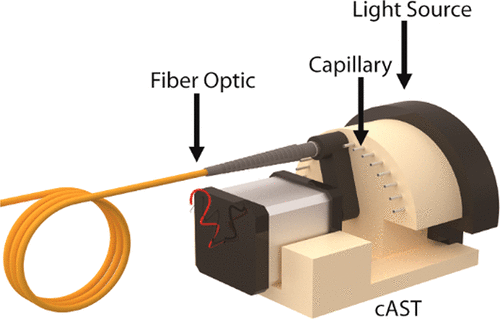当前位置:
X-MOL 学术
›
Anal. Chem.
›
论文详情
Our official English website, www.x-mol.net, welcomes your feedback! (Note: you will need to create a separate account there.)
cAST: Capillary-Based Platform for Real-Time Phenotypic Antimicrobial Susceptibility Testing.
Analytical Chemistry ( IF 7.4 ) Pub Date : 2020-01-16 , DOI: 10.1021/acs.analchem.9b04991 Ruisheng Wang 1 , Sasank Vemulapati 2 , Lars F Westblade 3, 4 , Marshall J Glesby 4 , Saurabh Mehta 5 , David Erickson 1, 5
Analytical Chemistry ( IF 7.4 ) Pub Date : 2020-01-16 , DOI: 10.1021/acs.analchem.9b04991 Ruisheng Wang 1 , Sasank Vemulapati 2 , Lars F Westblade 3, 4 , Marshall J Glesby 4 , Saurabh Mehta 5 , David Erickson 1, 5
Affiliation

|
Antimicrobial resistance is recognized as one of the greatest emerging threats to public health. Antimicrobial resistant (AMR) microorganisms affect nearly 2 million people a year in the United States alone and place an estimated $20 billion burden on the healthcare system. The rise of AMR microorganisms can be attributed to a combination of overprescription of antimicrobials and a lack of accessible diagnostic methods. Delayed diagnosis is one of the primary reasons for empiric therapy, and diagnostic methods that enable rapid and accurate results are highly desirable to facilitate evidence-based treatment. This is particularly true for clinical situations at the point-of-care where access to state-of-the-art diagnostic equipment is scarce. Here, we present a capillary-based antimicrobial susceptibility testing platform (cAST), a unique approach that offers accelerated assessment of antimicrobial susceptibility in a low-cost and simple testing format. cAST delivers an expedited time-to-readout by means of optical assessment of bacteria incubated in a small capillary form factor along with a resazurin dye. cAST was designed using a combination of off-the-shelf and custom 3D-printed parts, making it extremely suitable for use in resource-limited settings. We demonstrate that growth of bacteria in cAST is approximately 25% faster than in a conventional microplate, further validate the diagnostic performance with clinical isolates, and show that cAST can deliver accurate antimicrobial susceptibility test results within 4-8 h.
中文翻译:

cAST:用于实时表型抗菌药敏测试的基于毛细管的平台。
抗菌素耐药性被认为是对公共卫生的最大新兴威胁之一。仅在美国,抗微生物耐药性(AMR)微生物每年就影响近200万人,估计给医疗保健系统造成200亿美元的负担。AMR微生物的崛起可归因于抗菌药物处方过多和缺乏便捷的诊断方法。延迟诊断是经验疗法的主要原因之一,为了促进循证治疗,急切需要能够实现快速,准确结果的诊断方法。对于在医疗点缺乏最新诊断设备的临床情况尤其如此。在这里,我们介绍了一种基于毛细管的抗菌药敏测试平台(cAST),一种独特的方法,可以以低成本和简单的测试形式加快对抗菌素敏感性的评估。cAST通过光学评估以小毛细管形式因子与刃天青素染料一起孵育的细菌,可以加快读取时间。cAST是使用现成的和定制的3D打印部件组合设计的,因此非常适合在资源有限的环境中使用。我们证明,cAST中细菌的生长比常规微孔板中的细菌生长快约25%,进一步验证了临床分离株的诊断性能,并表明cAST可以在4-8小时内提供准确的抗药性试验结果。cAST通过光学评估以小毛细管形式因子与刃天青素染料一起孵育的细菌,可以加快读取时间。cAST是使用现成的和定制的3D打印部件组合设计的,因此非常适合在资源有限的环境中使用。我们证明,cAST中细菌的生长比常规微孔板中的细菌生长快约25%,进一步验证了临床分离株的诊断性能,并表明cAST可以在4-8小时内提供准确的抗药性试验结果。cAST通过光学评估以小毛细管形式因子与刃天青素染料一起孵育的细菌,可以加快读取时间。cAST是使用现成的和定制的3D打印部件组合设计的,因此非常适合在资源有限的环境中使用。我们证明,cAST中细菌的生长比常规微孔板中的细菌生长快约25%,进一步验证了临床分离株的诊断性能,并表明cAST可以在4-8小时内提供准确的抗药性试验结果。
更新日期:2020-01-17
中文翻译:

cAST:用于实时表型抗菌药敏测试的基于毛细管的平台。
抗菌素耐药性被认为是对公共卫生的最大新兴威胁之一。仅在美国,抗微生物耐药性(AMR)微生物每年就影响近200万人,估计给医疗保健系统造成200亿美元的负担。AMR微生物的崛起可归因于抗菌药物处方过多和缺乏便捷的诊断方法。延迟诊断是经验疗法的主要原因之一,为了促进循证治疗,急切需要能够实现快速,准确结果的诊断方法。对于在医疗点缺乏最新诊断设备的临床情况尤其如此。在这里,我们介绍了一种基于毛细管的抗菌药敏测试平台(cAST),一种独特的方法,可以以低成本和简单的测试形式加快对抗菌素敏感性的评估。cAST通过光学评估以小毛细管形式因子与刃天青素染料一起孵育的细菌,可以加快读取时间。cAST是使用现成的和定制的3D打印部件组合设计的,因此非常适合在资源有限的环境中使用。我们证明,cAST中细菌的生长比常规微孔板中的细菌生长快约25%,进一步验证了临床分离株的诊断性能,并表明cAST可以在4-8小时内提供准确的抗药性试验结果。cAST通过光学评估以小毛细管形式因子与刃天青素染料一起孵育的细菌,可以加快读取时间。cAST是使用现成的和定制的3D打印部件组合设计的,因此非常适合在资源有限的环境中使用。我们证明,cAST中细菌的生长比常规微孔板中的细菌生长快约25%,进一步验证了临床分离株的诊断性能,并表明cAST可以在4-8小时内提供准确的抗药性试验结果。cAST通过光学评估以小毛细管形式因子与刃天青素染料一起孵育的细菌,可以加快读取时间。cAST是使用现成的和定制的3D打印部件组合设计的,因此非常适合在资源有限的环境中使用。我们证明,cAST中细菌的生长比常规微孔板中的细菌生长快约25%,进一步验证了临床分离株的诊断性能,并表明cAST可以在4-8小时内提供准确的抗药性试验结果。



























 京公网安备 11010802027423号
京公网安备 11010802027423号